In 2002, EU Research Ministers decided at the EU Competitiveness Council to establish the European Strategy Forum on Research Infrastructures (ESFRI), bringing together the representatives of the EU Member States, Associated Countries and representatives of the Directorate General of the European Commission for Research and Innovation (DG RTD). Since then, the ESFRI facilitates strategy debates on emerging policy-making issues concerning the research infrastructures of the European character, importance and impact. Being one of the “ERA-related groups”, the ESFRI is the leading expert advisory body to the EU Competitiveness Council, providing expert advice on the preparation of policy-making and strategy papers on the research infrastructures in the EU. Since 2006, the ESFRI elaborates and publishes the “ESFRI Roadmap”, which includes European research infrastructures projects that have been identified as priorities for the development of the European Research Area. In the methodology area, the ESFRI contributes significantly to the creation of an adequate environment for the operations of research infrastructures in Europe. In this context, the ESFRI made a substantial contribution, e.g., to the adoption of the European Charter for Access to Research Infrastructures.
ESFRI responds to the SARS-CoV-2 / Covid-19 pandemic
Structure of ESFRI
The ESFRI is represented by its Chair, elected by the ESFRI forum formed by ESFRI delegates. The main coordination body of ESFRI´s activities is the Executive Board, consisted of the ESFRI Chair, delegate of the Directorate General of the European Commission for Research and Innovation (DG RTD) and ESFRI delegates, elected to act as Executive Board Members by the ESFRI forum. The ESFRI agenda is debated on the ESFRI Plenary meetings. The Strategy Working Groups are established to debate specific issues concerning the construction and operations of European research infrastructures in the thematic fields of physical sciences and engineering, energy, environmental sciences, health and food (biological and medical sciences), social sciences and humanities (social and cultural innovation) and e-infrastructures (data, computing and digital research infrastructures). The Implementation Group assess the progress in implementation of European research infrastructures projects, while the Monitoring Group focuses on the methodology framework thereof. In addition, other working groups are also set up by the ESFRI to address particular issues of European research infrastructures, such as their long-term sustainability or contribution to innovations. The Secretariat of the ESFRI is managed by the Directorate General of the European Commission for Research and Innovation (DG RTD).
Dr Jan Hrušák from the J. Heyrovsky Institute of Physical Chemistry of the Czech Academy of Sciences was elected new ESFRI Chair on the occasion of 65th ESFRI Plenary session. He became the first ESFRI Chair coming from Central and Eastern Europe. His mandate began on 1st January 2019 to 31st December 2021. Then he handed the ESFRI Presidency over to Jana Kolar.
The entire composition of delegation of the Czech Republic to ESFRI is enclosed.
Jana Kolar, ESFRI chair
ESFRI Roadmap
The first ESFRI Roadmap was elaborated in 2006, followed by its updates in 2008, 2010, 2016, 2018 and 2021. The ESFRI Roadmap includes the European research infrastructures with the “ESFRI Project” and “ESFRI Landmark” statuses. The “ESFRI Projects” are included due to their scientific excellence and advanced preparatory phase, anticipating the start of their implementation / construction phase within next 10 years. The “ESFRI Landmarks” have either completed their implementation / construction phase and entered the user operations or progressed in their implementation / construction phase so that they have a clearly defined timetable for the completion and commissioning. The latest 2021 update of the ESFRI Roadmap brings together a total of 63 European research infrastructures, of which 41 fall under the “ESFRI Landmark” and 22 under the “ESFRI Project” statuses.
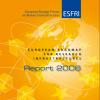
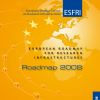
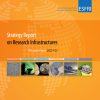
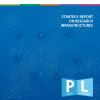

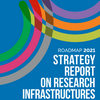
Besides ESFRI Roadmap the ESFRI presents the EU Member States´ and Associated Countries´ national roadmaps of research infrastructures, which set their national research infrastructures policy-making strategies. Expert papers produced by the ESFRI are published within the ESFRI Scripta edition.
e-Infrastructures Reflection Group
In parallel to the ESFRI, an expert forum on “e-infrastructures”, the e-Infrastructures Reflection Group (e-IRG) was established in 2003 to discuss the agenda of research infrastructures operated in the fields of information and communication technologies (ICT). The e-IRG fulfils similar role to that of the ESFRI, but is dedicated specifically to e-infrastructures. In the landscape of European research infrastructures, e-infrastructure plays a vital role. Their purpose is to provide the ICT services based on the technologies for exchange, processing, storage and archiving of research, development and innovation data, and interconnection of geographically distributed research teams, their experimental equipment and, thus, of the whole research infrastructures. The e-IRG addresses integration of European e-infrastructures within the European Research Area and beyond. In this context, the e-IRG provides its expertise to help develop policy-making procedures in the area of e-infrastructures so that the e-infrastructures for the research community in the EU are long-term sustainable and their ICT services meet high standards of their users.

